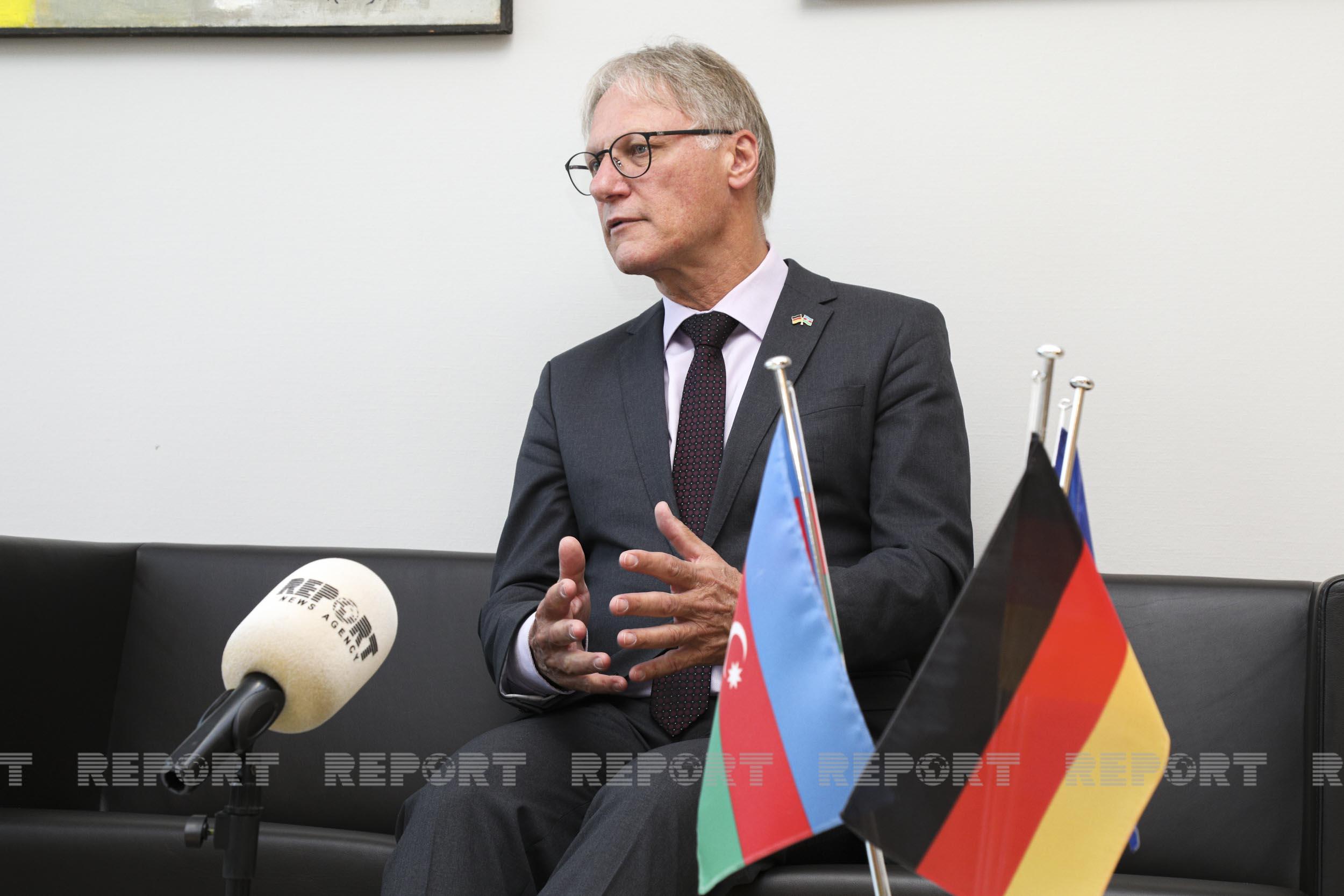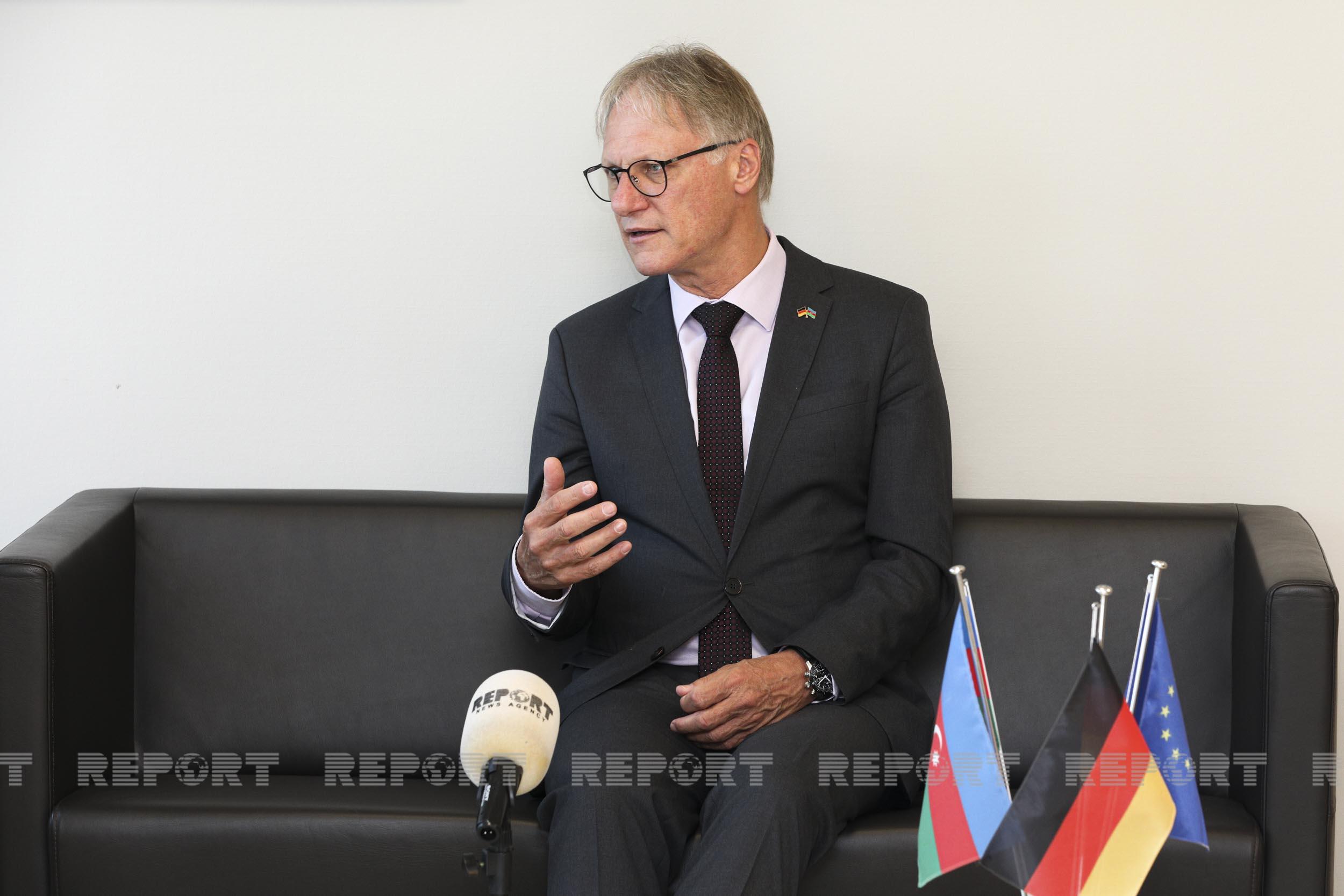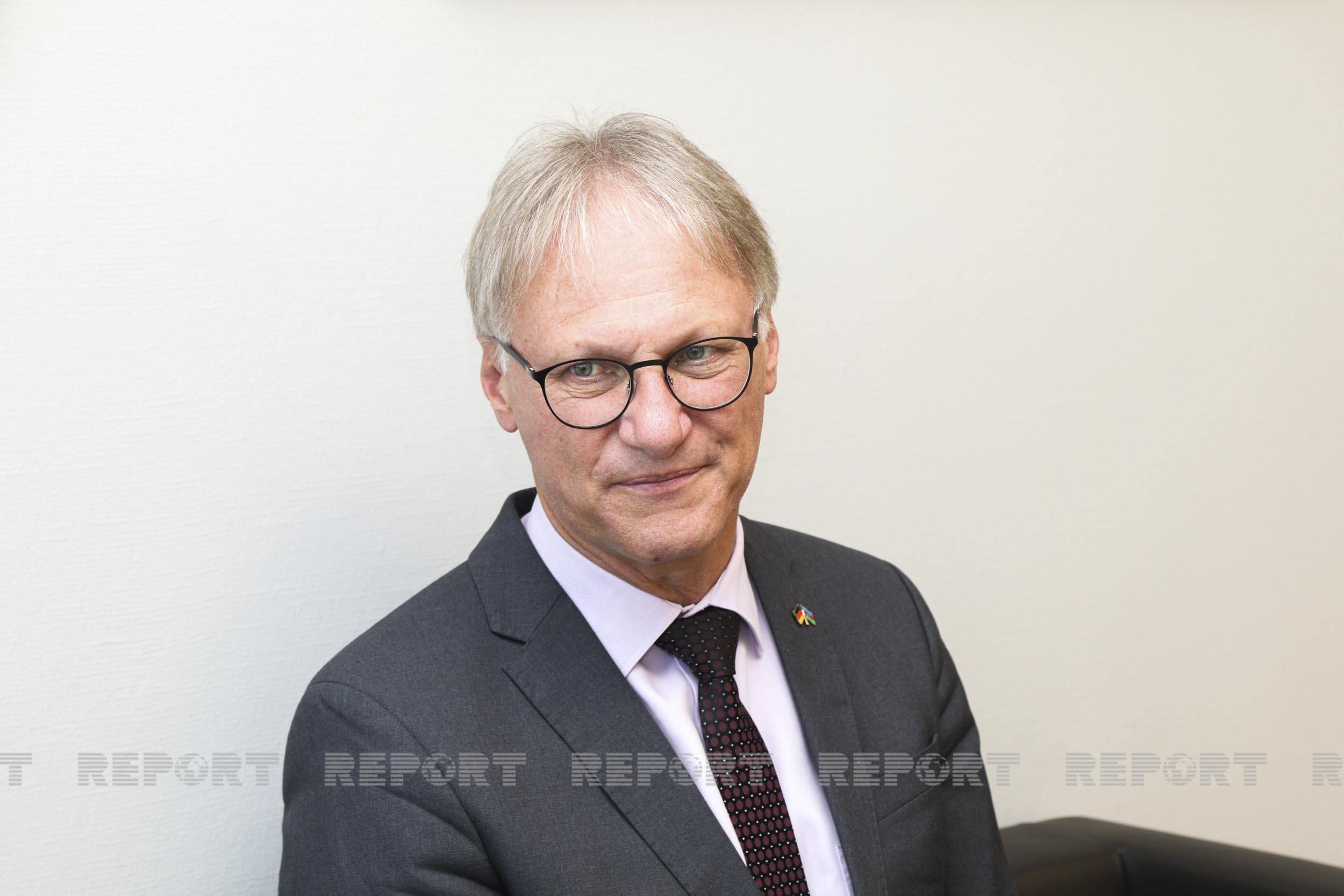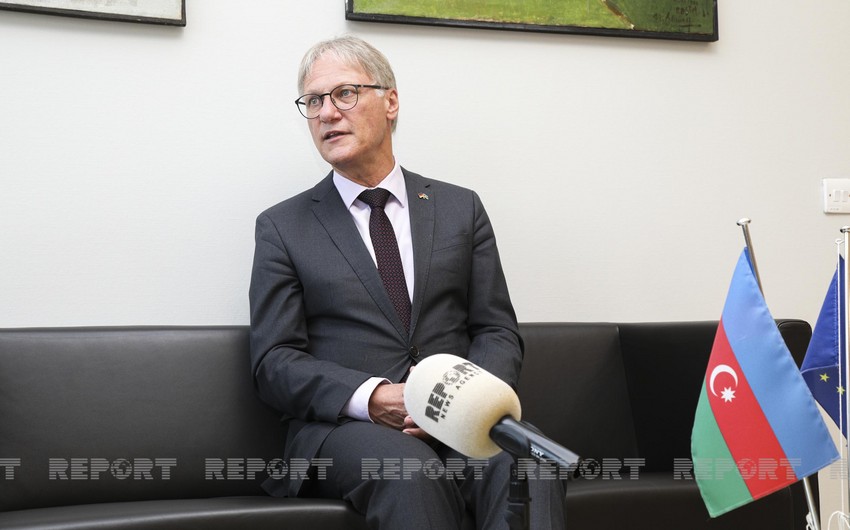Report interviews German Ambassador to Azerbaijan Wolfgang Manig.
On October 3, Germany celebrates the Day of German Unity, with occasion of which I congratulate you. Could you please tell us how the Embassy celebrates this day?
Thank you for your good wishes. For me and my German compatriots, the Day of German Unity is very important. A few months after the fall of the Berlin Wall and of more than 40 years of separation of our homeland into two states, belonging to the two antagonistic groups of superpowers, a peaceful reunification laid the foundation for a prosperous, democratic welfare-state based on the rule of law. Unfortunately, also in 2021 the pandemic does not allow to share our joy with our host country Azerbaijan and the international community living here. Instead, I have sent out a message on the occasion. Several posts in social media accompany the event. Therefore, I hope, that many of your readers will have the opportunity to share my thoughts and also our commitment to strive for a peaceful, united Europe.
Which sectors of cooperation play vital role in the cooperation between Azerbaijan and Germany?
Azerbaijan is our the most important economic partner in South Caucasus. For 200 years, Germans settle in Azerbaijan and played an important role for both the economic, social, intellectual and in the first decades after the creation of the Azerbaijan Democratic Republic for the political development of Azerbaijan. Therefore, our cooperation is focused in energy, trade, education and in the support of the reform policy. In international fora and bilaterally, Germany offers her good services for a peaceful and sustainable reconciliation among Azerbaijanis and Armenians.

Can we expect any new projects between two countries in economic and humanitarian sector? If so, could you please tell us more about it?
Germany continues to work together with its Azerbaijani partners both in the government and in the broader civil society for the reform of economy, society and environment. In our opinion, our common cultural heritage plays an important role. Therefore, I expect that before long the government of Azerbaijan will present its views on our proposal for a modern bilateral agreement on cooperation in the Fields of Culture, Education, Science, Youth and Sport. In these fields, bilateral cooperation can have very positive effects, also in other areas like vocational and educational training, preparing IDPs for their return to the territories which had been occupied in the last three decades. The German-Azerbaijani Chamber of Commerce (AHK) acts as platform for German companies interested to do business in Azerbaijan, including the reconstruction of the just mentioned territories.
How is the process of implementing of the joint declaration between the Ministry of Economy of Azerbaijan and the Federal Ministry of Economy and Energy of Germany on March 2, 2021 on the intentions to continue cooperation on professional development of going?
It is important for every modern economy to dispose of skilled workers – blue and white collar workers and including the management. The joint declaration which you mentioned comprises the training of Azerbaijani managers – Manager Training Program/MTP. The MTP enables – already in its 11th year - the managers of Azerbaijani companies to become resilient in a globalized world and to compete worldwide. Both women and men interact with German companies. Even in the times of pandemic, the program continues – online in 2020 and 2021, but hopefully also physically in 2022.
In 2020, Azerbaijan's foreign trade turnover with Germany amounted to $817.58 million, including exports in the amount of $234.11 million and imports in the amount of $583.47 million. This indicator shows a significant decline. How do Azerbaijan and Germany fight the impact of pandemic to the all sectors of economy? In particular tourism and trade?
The pandemic affected the global trade. Our bilateral economic relations had also been affected. I am, however, confident that the decline will not last. Both the German and the Azerbaijani economies survived the global impact of the pandemic quite well. With an increased demand for energy, Azerbaijan continues to play an important role for Germany’s efforts for diversification of energy supplies. Azerbaijan’s strategy for green energy and hydrogene-based energy will be attractive for German technology. As far as tourism is concerned, we hope that Germans will again detect the beauty of Azerbaijan’s landscape, the friendliness and hospitality of her population, wine and dine offered both in the culture-rich cities and in the countryside. With the resumed flights of Lufthansa German Airlines, a direct link between Azerbaijan and Germany is reestablished since mid-August. Increased frequencies demonstrate the growth of this sector.

In your opinion, how can the signing of a Memorandum of Understanding on energy policy dialog between the two countries foreign ministries increase the cooperation data and Azerbaijan's role as a gas transit country to Europe?
I am very satisfied that the Minister of Energy of Azerbaijan regularly honors the invitations of the Federal Ministers for Foreign Affairs and for Economy and Energy to attend the Berlin Energy Transition Dialogue. With the TAP, the gas pipeline network between Azerbaijan and Western Europe has been completed. The company UNIPER, based in Düsseldorf/Germany, plays an important role for the gas supply of Germany. Furthermore, the German Renewable Energy Agency DENA and the Ministry of Energy of the Republic of Azerbaijan cooperate closely in the development of renewable energies and energy efficiency. Thus, Germany supports directly Azerbaijan’s policy to strengthen the non-oil sector and to make Azerbaijan fit for the post-oil era.
As we know, the participation of German companies in the restoration of the liberated lands of Azerbaijan is fully up to them. So far, how do the embassy show the German private sector more possibilities of the liberated lands to attract these companies in the reconstruction process?
The German-Azerbaijani Chamber of Commerce (AHK) provides useful information about economic opportunities for German companies in the former occupied territories. The German Federal Government has – since the early days of the occupation of Azerbaijan territories – emphasized the territorial integrity of Azerbaijan calling both Azerbaijanis and Armenians to work out a sustainable formula which enables the latter to live in security under Azerbaijani sovereignty. With this in mind, I prepare a fact finding trip to various parts of the returned territories in order to identify both reconstruction needs, demining challenges and humanitarian challenges for a safe resettlement of all displaced persons of whatever ethnicity. German companies of all sectors including commercial demining companies, construction, service and commerce sectors will be fully informed accordingly.

As you earlier said we know Germany plans to bring Azerbaijani civil society to the joint platform to work on the elimination of heavy metal pollution of the transboundary Okhchuchay river. In this regard, a meeting with the UN has been planned. How is the work in this direction going? Which exact steps does German embassy and the government implement to stop the pollution of the river by Kronimet Mining?
A healthy and clean environment is crucial for human survival. Particularly where irrigation is central for agriculture, pollution of water resources has to be eliminated. With great interest we learnt about the activities of Armenian environmental activists back in 2019 to put pressure on the mining industry in the border areas. Eventually, a German company sold its shares in 2019, others, non-German companies, seem to continue. The German government supports the creation of a clean environment worldwide - also in South Caucasus. For years, GIZ runs a regional program on environment. Within this program, a platform for the exchange of information has been created. The German government intends to use this platform to invite experts from the region – Azerbaijan, Armenia, Georgia – to meet with German experts. The UN Environmental Program had been contacted by the stakeholders as well. With UNEP’s assistance, the expertise could even become wider. I am convinced that the pollution can be stopped and the mitigation of the damages can start by interaction of regional experts. Future generations may blame us for not resolving political quarrels – but they will curse us if we leave them the Earth uninhabitable.


 https://static.report.az/photo/4c6be623-9a02-321f-8c0b-4449acc948d7.jpg
https://static.report.az/photo/4c6be623-9a02-321f-8c0b-4449acc948d7.jpg

